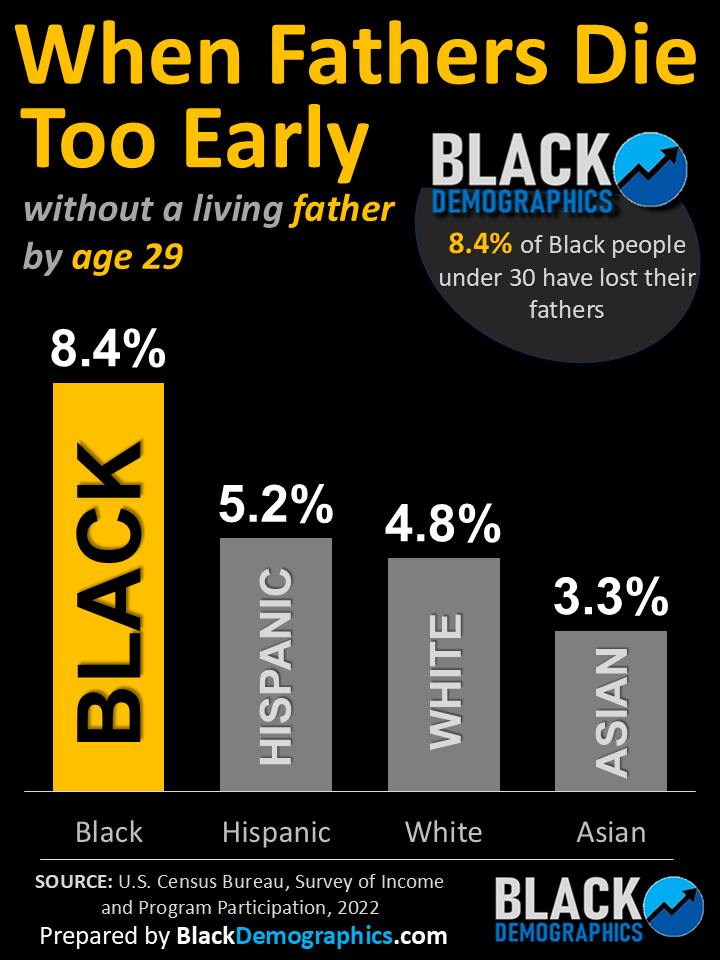According to data from the U.S. Census Bureau’s 2022 Survey of Income and Program Participation (SIPP), 8.4% of Black Americans aged 0–29 have lost their fathers — the highest rate among all racial and ethnic groups. These numbers highlight a quiet but deeply consequential reality: Black children and young adults are more likely to experience the death of a parent than their peers.
This early loss isn’t just a statistic — it’s a source of long-term grief, economic disruption, and emotional trauma that affects families and communities across generations.

Editor’s Note: A previous version of this chart was removed due to an error in how the data was represented. This updated version provides a clearer and more accurate reflection of the findings from the Census Bureau’s 2022 SIPP report. We appreciate your patience and commitment to data integrity.
This article is based on the Census Bureau’s released 2024 report, “Differences in Parental Mortality by Age and Race/Ethnicity.”
Table: Parental Loss by Race (Ages 0–29)
| Race/Ethnicity | Father Deceased | Mother Deceased | At Least One Parent Deceased | Both Parents Deceased |
|---|---|---|---|---|
| Black | 8.4% | 2.4% | 10.4% | 0.4% |
| Hispanic | 5.2% | 1.9% | 6.6% | 0.3% |
| Asian | 3.3% | 1.0% | 3.7% | 0.2% |
| White | 4.8% | 2.3% | 6.8% | 0.3% |
Source: U.S. Census Bureau, 2022 SIPP, Table 1
The Deeper Story: When That Loss Happens
The 8.4% figure tells us how many Black people under age 30 have lost their fathers. But what about when that loss occurred?
According to the same report, nearly 1 in 4 Black individuals who lost their fathers experienced that loss before turning 20 — the highest early loss rate among all racial groups.
It’s important to note:
This 25% figure represents a subset — not the entire Black population under 20, but only those who reported a deceased father and knew how old they were when he died.
So among Black people who have lost their fathers, a significant portion experienced that tragedy during childhood or adolescence.
Table: Age at Father’s Death Among the Bereaved
| Race/Ethnicity | Lost Father by Age 10 | By Age 19 | By Age 25 |
|---|---|---|---|
| Black | 10.6% | 24.6% | 30.7% |
| Hispanic | 11.1% | 22.3% | 29.2% |
| Asian | 7.6% | 18.2% | 27.0% |
| White | 5.4% | 14.0% | 20.3% |
Source: U.S. Census Bureau, Table 3 (2022 SIPP)
Why It Matters
Early parental death disrupts far more than a household. It can impact education, income, housing stability, mental health, and access to opportunity. When these losses happen disproportionately in the Black community, the consequences compound across generations.
This is not just a family issue — it’s a reflection of broader inequities in health, violence, poverty, and lifespan that continue to impact Black Americans at every stage of life.
Moving Toward Healing
To reduce these disparities, we must:
- Improve access to quality healthcare for Black men and women.
- Address preventable causes of early death, including chronic disease and community violence.
- Fund grief support services for children and young adults.
- Center Black families in public health and social service strategies.
*Estimated based on overlapping losses; not additive.
For more data-driven stories like this, visit BlackDemographics.com
Source: U.S. Census Bureau, Survey of Income and Program Participation, 2022

